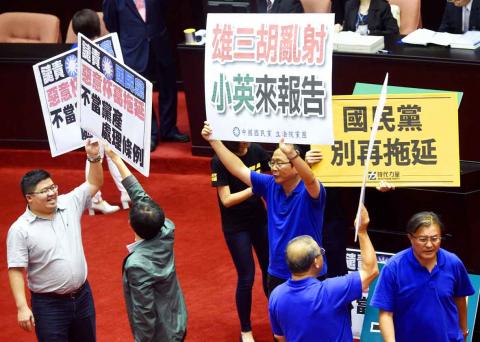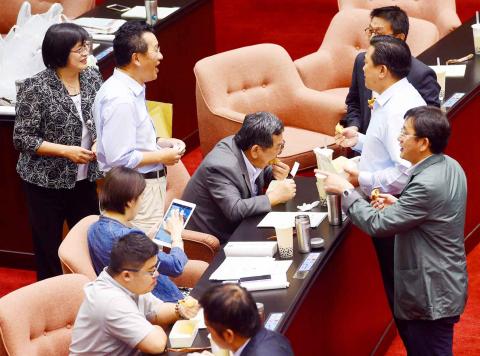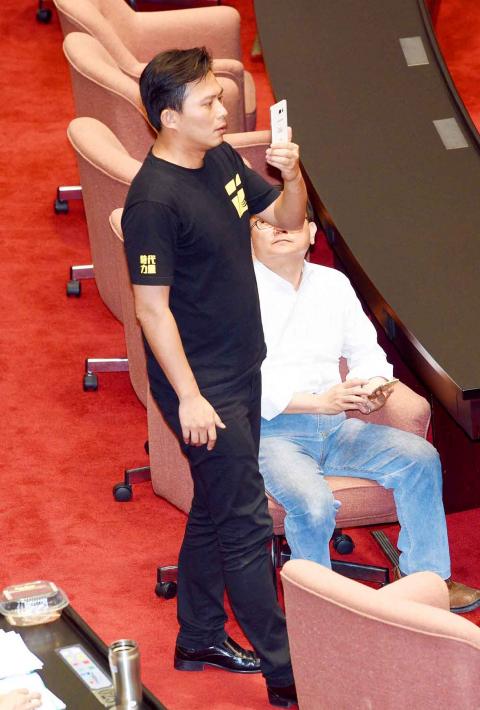The Chinese Nationalist Party (KMT) caucus yesterday obstructed scheduled legislative proceedings to pass a bill on ill-gotten party assets by calling for votes on each first-reading bill on the floor agenda, of which there were more than 200.
The Democratic Progressive Party (DPP) caucus and the New Power Party (NPP) proposed to extend the meeting until midnight.
The legislative floor meeting commenced later than usual yesterday morning, as the DPP caucus had a prolonged caucus meeting, after which DPP caucus whip Ker Chien-ming (柯建銘) said the caucus planned to achieve two things — the passage of the bill on ill-gotten party assets and the announcement of a joint statement concerning the South China Sea ruling.

Photo: Lo Pei-der, Taipei Times
The latter was achieved, while the former had not been dealt with as of press time last night.
Soon after the general assembly meeting started, the KMT caucus demanded a roll call vote as the method of voting in yesterday’s meeting, which DPP lawmakers and Legislative Speaker Su Jia-chyuan (蘇嘉全) said would have to be decided by a vote.
DPP Legislator Wu Ping-jui (吳秉叡) shouted in the chamber: “The voting system we have now is already a name-registering vote. I see no reason why the KMT caucus has to raise the need to change it, other than to try to hamper legislative proceedings and protect their party assets.”

Photo: Lo Pei-der, Taipei Times
The voting system in the general assembly chamber consists of two electronic boards at the front of the chamber that display the names of lawmakers and flashes green, red or yellow for “yea,” “nay” and abstain respectively.
NPP Executive Chairman Huang Kuo-chang (黃國昌) also criticized the KMT caucus, saying its measures were “ridiculous” and calling on the party to “stop throwing a fit and step back from the brink.”
KMT lawmakers, all clad in blue in a show of solidarity, from that point on called for a roll call vote, a vote and a revote for each first-reading bill that was to be referred to committees for review by dissenting against which committees the proposals were to be referred to.

Photo: Lo Pei-der, Taipei Times
There were a total of 276 cases to be referred to committees on the floor agenda yesterday.
In the morning, only six of the 276 were processed. Under typical legislative procedures, the second and third readings of bills on the discussion agenda would be dealt with only after all the committee-referral cases were done.
In the front of the chamber, the KMT lawmakers held up placards and chanted slogans demanding that President Tsai Ing-wen (蔡英文) report to the Legislative Yuan on the recent accidental launch of a missile and a ruling on the South China Sea by an international court.
One placard asked if Tsai was a US lackey, while another read: “An inch of [our] mountains and rivers [equals] an inch of [our] blood,” a phrase first used by the Republic of China’s armed forces during the Second Sino-Japanese War.
“Defend our sovereignty and protect our fishing rights,” was another slogan the KMT lawmakers repeated.
In the middle of voting in the evening, NPP Legislator Freddy Lim (林昶佐) discovered that newly elected KMT caucus convener Sufin Siluko (廖國棟) was pressing the voting button for former legislative speaker Wang Jin-pyng (王金平), who was absent, which was condemned.
KMT lawmakers later accused DPP lawmakers of voting for other legislators who had temporarily left their seats.
Yesterday was the last day of this year’s first legislative session.
Two extraordinary sessions later this month and next month are expected to be called, the DPP caucus said earlier this week.
The legislature was dealing with the 58th item on the agenda as of 9pm yesterday.
Additional reporting by Abraham Gerber

DAREDEVIL: Honnold said it had always been a dream of his to climb Taipei 101, while a Netflix producer said the skyscraper was ‘a real icon of this country’ US climber Alex Honnold yesterday took on Taiwan’s tallest building, becoming the first person to scale Taipei 101 without a rope, harness or safety net. Hundreds of spectators gathered at the base of the 101-story skyscraper to watch Honnold, 40, embark on his daredevil feat, which was also broadcast live on Netflix. Dressed in a red T-shirt and yellow custom-made climbing shoes, Honnold swiftly moved up the southeast face of the glass and steel building. At one point, he stepped onto a platform midway up to wave down at fans and onlookers who were taking photos. People watching from inside

A Vietnamese migrant worker yesterday won NT$12 million (US$379,627) on a Lunar New Year scratch card in Kaohsiung as part of Taiwan Lottery Co’s (台灣彩券) “NT$12 Million Grand Fortune” (1200萬大吉利) game. The man was the first top-prize winner of the new game launched on Jan. 6 to mark the Lunar New Year. Three Vietnamese migrant workers visited a Taiwan Lottery shop on Xinyue Street in Kaohsiung’s Gangshan District (崗山), a store representative said. The player bought multiple tickets and, after winning nothing, held the final lottery ticket in one hand and rubbed the store’s statue of the Maitreya Buddha’s belly with the other,

‘NATO-PLUS’: ‘Our strategic partners in the Indo-Pacific are facing increasing aggression by the Chinese Communist Party,’ US Representative Rob Wittman said The US House of Representatives on Monday released its version of the Consolidated Appropriations Act, which includes US$1.15 billion to support security cooperation with Taiwan. The omnibus act, covering US$1.2 trillion of spending, allocates US$1 billion for the Taiwan Security Cooperation Initiative, as well as US$150 million for the replacement of defense articles and reimbursement of defense services provided to Taiwan. The fund allocations were based on the US National Defense Authorization Act for fiscal 2026 that was passed by the US Congress last month and authorized up to US$1 billion to the US Defense Security Cooperation Agency in support of the

‘COMMITTED TO DETERRENCE’: Washington would stand by its allies, but it can only help as much as countries help themselves, Raymond Greene said The US is committed to deterrence in the first island chain, but it should not bear the burden alone, as “freedom is not free,” American Institute in Taiwan Director Raymond Greene said in a speech at the Institute for National Defense and Security Research’s “Strengthening Resilience: Defense as the Engine of Development” seminar in Taipei yesterday. In the speech, titled “Investing Together and a Secure and Prosperous Future,” Greene highlighted the contributions of US President Donald Trump’s administration to Taiwan’s defense efforts, including the establishment of supply chains for drones and autonomous systems, offers of security assistance and the expansion of